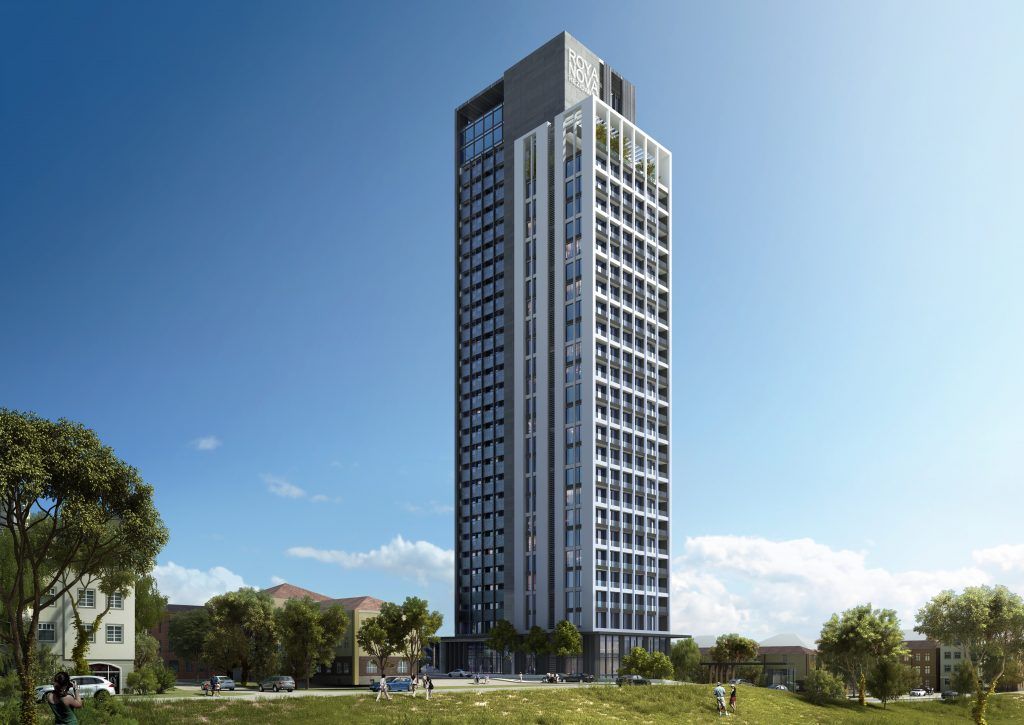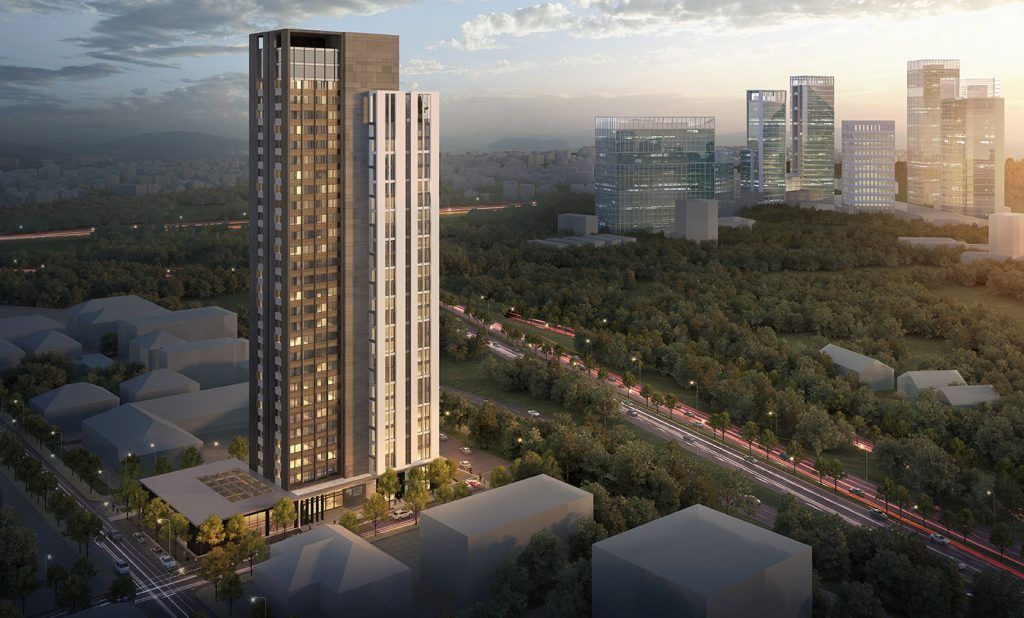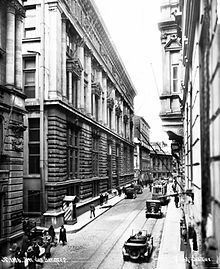Istanbul Finance Center Project – Property in Turkey
- City: ISTANBUL PROPERTY
- Property type: Apartment
- Bedrooms: 1
- Offer type: Atasehir Residence
- Neighborhood: ATAŞEHİR
- Bathrooms: 1
- Property size: 68 m²
- Property ID: 16092
Details
This Luxury Project is located in the vicinity of Istanbul Finance Center. The project rising on the Anatolian Side consists of a total of 246 units.
The project area of the residence, which has a mixed structure is 3.307 sqm. And, the construction area is 28.100 m². Roya Nova offers studio flats, 1+1, 2+1, 3+1 flat options, which can be tailored to your needs. Unlike other residences, the balconies of the residences in the project have windows that can be opened.
There are 246 units in the housing project, developed with the signature of Roya Yapi. The project has 4 basements, reception and 30 residence floors.
Social Areas That Enable You To Get Involved In Life
Roya Nova Rezidans rising right next to the Financial Center, has an area of 1.024 m² has been allocated for the social facilities. There are areas where you can carry out your business and meet your social needs without leaving Roya Nova. With 3 meeting rooms equipped to meet your expectations, you can arrange meetings to speed up your work. Also, you can keep the form you longed for with a comprehensive gym and pilates area where you can also do group lessons.
You will enjoy life to the full with the presence of specially designed areas such as sauna, steam room, massage room, shock shower, dressing rooms! All kinds of shops you would need in daily life will be on your doorstep. You can organize events and welcome your friends on the terrace with a sea view and a common area.
There are many common areas in Roya Nova Residence housing project, including a movie theater, a karaoke room, a restaurant, a cafe. There are an open-air cinema, a swimming pool and a barbecue area, where you can enjoy yourself with your loved ones.
Overview
A view of Levent business district in Istanbul, 2013
Historically, Istanbul has been the center of the country’s economic life because of its location as an international junction of land and sea trade routes. In 2012 the City of Istanbul had a GDP of $332.4 billion.[1]
In 2008, companies based in Istanbul made exports worth $41,397,000,000 and imports worth $69,883,000,000; which corresponded to 56.6% and 60.2% of Turkey’s exports and imports, respectively, in that year.[2] In 2006 Turkey’s exports grew a further +16.1% while imports grew +17.6% because of a rising demand of energy resources and raw materials by the industrial manufacturers in the country.[3]
According to Forbes magazine, Istanbul had a total of 37 billionaires in 2013, ranking 5th in the world behind Moscow (84 billionaires), New York City (62 billionaires), Hong Kong (43 billionaires) and London (43 billionaires).[4]
Income distribution is not evenly distributed in Istanbul, such that 20% of the highest income group uses 64% of the resources and 20% of the lowest income group uses 4% of the resources (based on 1994 statistics).[5]
Bosphorus Bridge (1973) connecting Europe and Asia
The change in Istanbul’s living standards is a direct reflection of the nation’s statistics as the 27.5% share of the total consumption in Turkey is performed by the population of Istanbul.
In the late 1990s, the economy of Turkey, and Istanbul in particular, suffered several major depressions. The Asian financial crisis between July 1997 and the beginning of 1998, as well as the crisis in Russia between August 1998 and the middle of 1999 had negative effects in all areas of the economy, particularly on exports. Following this setback, a slow reorganization of the economy of Istanbul was observed in 1999.
The major earthquake which was epicentered in nearby Kocaeli on 17 August 1999, triggered one of the largest economic shocks for the city. Apart from the capital and human losses caused by the disaster, a decrease in GDP of approximately two percent occurred. Despite these downturns, Istanbul’s economy has strongly improved and recovered in following years.
Istanbul was hit hard by the 2018 Turkish currency and debt crisis. As of August 2018, almost one-third of office space in Turkey’s commercial capital of Istanbul lies vacant, and office rental prices across all segments have fallen sharply.[6]
Financial Sector
Bankalar Caddesi, mentioned as Voyvoda Yolu in the 17th century Seyahatnâme of Evliya Çelebi,[7] was Istanbul’s financial centre during the Ottoman period. Completed in 1892, the Ottoman Central Bank headquarters is seen at left.
Istanbul has always been the “financial capital” of Turkey, even after Ankara became the new political capital in 1923. The opening of specific markets in the city during the 1980s further strengthened this status. Inaugurated at the beginning of 1986, the Istanbul Stock Exchange (ISE) is the sole securities market of Turkey, established to provide trading in equities, right coupons, Government bonds, Treasury bills, revenue sharing certificates, bonds issued by the Privatization Administration and corporate bonds, and to carry out overnight transactions.[8]
In 1993 the ISE decided on gold market liberalization, and in 1995 the Istanbul Gold Exchange was established, which ended the gold bullion imports monopoly of the Turkish Central Bank and transferred it to the private sector members of the gold exchange.[9]
Levent, Maslak and Şişli financial districts are home to the headquarters of Turkey’s largest companies and banks, as well as the local headquarters of global giants of the financial sector such as Citibank, Merrill Lynch, J. P. Morgan, HSBC, ABN Amro, Fortis, ING Bank, BNP Paribas, Société Générale, Banca di Roma, UniCredit, WestLB, Deutsche Bank, Commerzbank, Milli Reasürans, VHV Reasürans and many others. Both Levent and Maslak have a constantly growing and changing dynamic skyline with several new skyscraper projects being proposed, approved and initiated every year.
- ID: 16092
- Published: May 7, 2021
- Last Update: August 20, 2022
- Views: 564


















